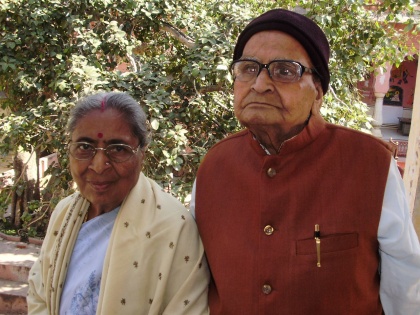Independence Day 2023: The pen is mightier: Rajendra Kumar ‘Ajeya’
By Anubha Jain | Published: August 7, 2023 11:39 AM2023-08-07T11:39:12+5:302023-08-07T11:39:44+5:30
Ajeya, a poet, freedom fighter, social reformer, hard-core Congressman, and journalist encouraged people to stand up against colonial rule ...

Independence Day 2023: The pen is mightier: Rajendra Kumar ‘Ajeya’
Ajeya, a poet, freedom fighter, social reformer, hard-core Congressman, and journalist encouraged people to stand up against colonial rule and feudalism. He wrote for several newspapers across the country. His writing contribution and political satires for Mohan Lal Sukhadiya’s Navyug, Hira Lal Shastri’s Lokvaani Dainik, and Jai Narayan Vyas’s Rashtradoot newspapers were impeccable. His news reports were sent to Delhi Newspapers by the famous journo Chandra Gupt Varshney. Because of these conducts, he was accused on six different counts and prisoned for 42 months in Ajmer Central Jail.Born in Aligarh, Uttar Pradesh, on February 14th, 1916, Kumar graduated from Hurbert College in Kota, Rajasthan. In a candid conversation with me his son, Atul told, “We children used to call him Babuji. Since childhood, he was captivated by Arya Samaj's ideology. In Kota, Babuji and his three comrades got famous by the name of ‘Vishwa Bandhu’ as they schooled people against the British Raj through literary, and educational activities.”
Ajeya got a job with Rajasthan Weekly, which published Ajeya’s interview headlined ‘Yeh jaroori nahi ki bhigi baarood kabhi dhamaka hi naa kare’ in 1932-33 with poet and revolutionary Kesari Singh Bareth. Atul shared, “It brought pressure on Babuji to quit his job, and the British ordered an inquiry into the article.”When Jawaharlal Nehru was travelling from Rajasthan’s Beawar to Ahmedabad in 1934, Ajeya lined his route with the Congress flag and, with the help of 500-odd farmers, blocked Nehru’s way. Forced to stop, Nehru delivered a rousing speech. Inspired by Nehru, Ajeya joined Congress as a party worker and went to Pt. Haribhau Upadhyay’s Hatundi Aashram near Ajmer. From Kota, he was the first person to join Congress and later started the Congress unit there. Through his writing, Ajeya also raised awareness against the jaagirdari law in Masuda, Ajmer, and police torture in Jalia, Vijay Nagar.
Ajeya and his wife Prabhawati were highly inspired by Subhash Chandra Bose. When Bose asked to give blood in return for freedom, they wrote a letter to Bose with their elder sons Anil and Akhil's blood. In the year 1937-38, Ajeya organized the Kandheda Farmers’ Conference and also participated in the 91st session of the Haripura Congress where he met with Mahatma Gandhi, Kasturba Gandhi, Subash Chandra Bose, and Pt. Nehru.In 1941 Ajeya went to Mumbai and, the following year, when Aruna Asif Ali hoisted the Indian flag and started the Quit India Movement at Gowalia Tank, he was the only freedom fighter from Rajasthan who attended this defining event.Back in Kota in 1943, Ajeya co-founded Dinabandhu Weekly with Naathu Lal Jain, which created pressure on the government for citizen rights and responsible governance in the states and also ignited a spark among the youth in the Indore-Kota-Bikaner belt, which would later become the backbone of people’s participation in the freedom movement.Ajeya became a member of the Khadi Association in Govindgarh and spread Gandhi's ideology and use of Khadhi among the masses.For social awareness and naturally for his satires, in 1965, he founded his own weekly newspaper ‘Hamaara Vatan’. Under the leadership of Jamna Lal Bajaj in Jaipur an agitation was initiated in 1947 by the Prajamandal. Through Politician Hira Lal Shastri’s insistence Pt. Haribahu allowed Ajeya to join Prajamandal and after that, Ajeya robustly worked with mandal activities.Conferred with many recognitions, Ajeya was awarded by the then PM Indira Gandhi also. On 28th April 2015, Rajendra Kumar breathed his last, at the age of 99. His daughter Abha reminisced, “As state honour and at the time of Babuji’s funeral, his body was wrapped in the Indian flag and a 21-gun salute was given.”